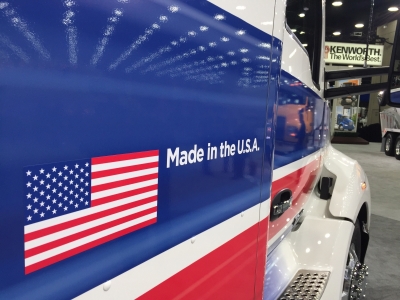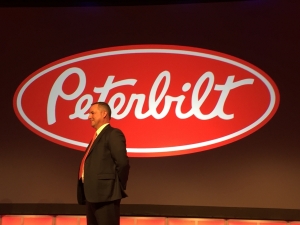Suppliers predict growing truck market

LOUISVILLE, KY – What a difference a few months can make. Earlier this year, Bendix Commercial Vehicle Systems was projecting Class 8 truck sales would drop about 5-10%. Now it’s projecting the market will grow about 5%.
“Overall, I think the economy has turned for us in the trucking industry,” chairman Joe McAleese observed, citing growing truck orders and dropping cancellations. Truck tonnage and utilization are both seen as under control.
It was a theme repeated at several briefings during the Mid-America Trucking Show’s media day.
 Kenworth and Peterbilt are projecting a Class 8 market of 190,000 to 220,000 trucks, on top of about 85,000 medium-duty units, which at the very least is in line with volumes seen in 2016.
Kenworth and Peterbilt are projecting a Class 8 market of 190,000 to 220,000 trucks, on top of about 85,000 medium-duty units, which at the very least is in line with volumes seen in 2016.
Freight tonnage is up 1-2%, prices are improving in the sport freight market, and oil rig counts are rising, said Kyle Quinn, Peterbilt’s recently named general manager. The market for used trucks is seen as a “headwind” but is expected to stabilize, he said.
Several underlying economic trends seem to be playing a role. Construction is at a 10-year high, and auto sales are solid, noted Kenworth general manager Mike Dozier, adding that consumer confidence is at a 15-year high and forecast to remain strong. Inflation, gasoline prices, unemployment, and interest rates are all relatively low.
A new presidential administration’s promise of tax relief could drive more customers to buy equipment, Quinn added.
McAleese pointed directly at the promise of pro-business regulations and tax reforms when explaining the general enthusiasm in the stock market. “People are moving on the anticipation of things to come,” he said.
But the Bendix chairman questioned whether U.S. President Donald Trump’s target of a 4% growth in the Gross Domestic Product was achievable, and raised concerns about a proposed border adjustment tax that would offer a competitive tax advantage for companies that make goods in the U.S. rather than importing products.
“The corporate tax proposal, it’s not going to reduce taxes. It’s going to have winners and losers,” he said, adding that it would affect choices in suppliers. “I don’t believe it’s going to achieve the objective.”
PACCAR’s Peterbilt and Kenworth, meanwhile, were both stressing their U.S.-based manufacturing capabilities.
“‘Made in the USA’ is part of the Kenworth fabric,” Dozier said, referring to the 2,000 employees at manufacturing facilities in Chillicothe, Ohio and Renton, Washington. In the last five years, about US $70 million has been invested in those operations as well.
Peterbilt noted that it recently completed work on an expanded plant in Denton, Texas, opening a new 102,000-square-foot test building and starting to work with a new Automated Storage Retrieval System that holds 400 painted hoods, sleepers and cabs. The overall facility now covers 600,000 square feet.
If the market projections are correct, they will all be busy.
Have your say
This is a moderated forum. Comments will no longer be published unless they are accompanied by a first and last name and a verifiable email address. (Today's Trucking will not publish or share the email address.) Profane language and content deemed to be libelous, racist, or threatening in nature will not be published under any circumstances.